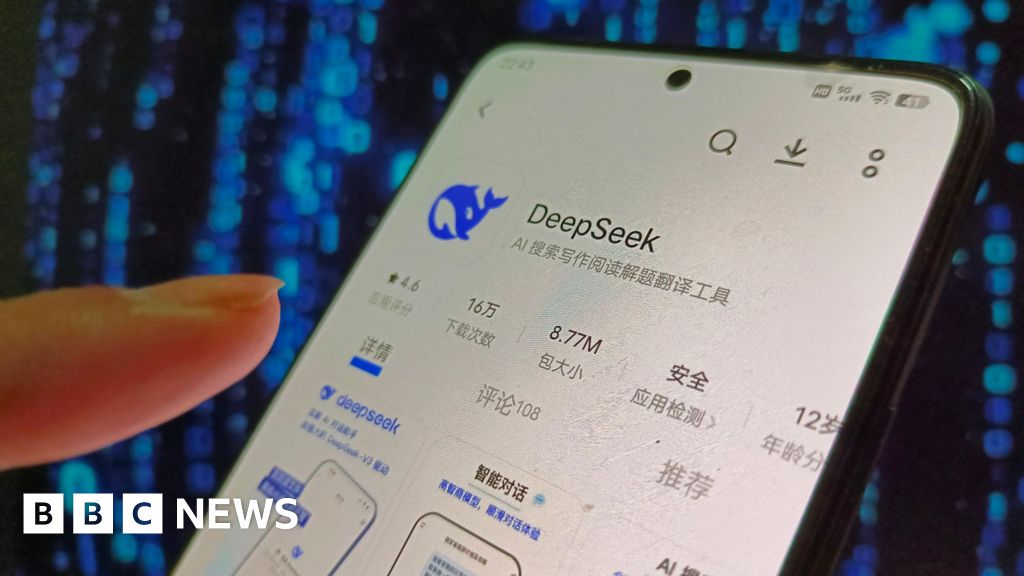Chinese chatbot DeepSeek AI is causing market disruption for competitors
The value of shares of major US technology companies fell sharply after the sudden appearance of a low-cost chatbot created by a Chinese artificial intelligence company.
DeepSeek, which launched last week, has overtaken competitors including ChatGPT to become the most downloaded free app in the US.
Shares of chip giant Nvidia fell 10% while shares of Microsoft and Meta also fell in early US trading on Monday.
The chatbot was reportedly developed for a fraction of the cost of its competitors, raising questions about the future of US AI dominance and the scale of investments US companies are planning.
It is powered by the open source DeepSeek-V3 model, which its researchers say was developed for less than $6m (£7.5m) – far less than the billions spent by competitors.
But this claim has been disputed by others in the field of artificial intelligence.
The researchers say they are using technology that already exists, as well as open source code, which is software that anyone can use, modify or distribute for free.
The emergence of DeepSeek comes as the United States restricts the sale of advanced chip technology that supports artificial intelligence to China.
To continue their work without a steady supply of advanced imported chips, Chinese AI developers have shared their work with each other and experimented with new approaches to the technology.
This has led to the emergence of artificial intelligence models that require much less computing power than before. It also means that it costs much less than previously thought, which could turn the industry upside down.
After launching DeepSeek-R1 earlier this month, the company boasted “performance on par with” one of the latest OpenAI models that makes ChatGPT — when used for tasks like mathematics, programming, and natural language reasoning.
Marc Andreessen, a Silicon Valley venture capitalist and adviser to Donald Trump, described DeepSeek-R1 as “AI’s Sputnik moment,” referring to the satellite launched by the Soviet Union in 1957.
At the time, the United States was seen as being caught off guard by its rival’s technological achievement.
DeepSeek’s popularity has stunned the markets. ASML, the Dutch chip equipment maker, saw its share price fall more than 10%, while shares of Siemens Energy, which makes AI-related devices, fell 21%.
“The idea of a low-cost Chinese version was not necessarily at the forefront, so it caught the market a bit by surprise,” said Fiona Cincotta, chief market analyst at City Index.
“So, if you suddenly get this low-cost AI model, it will raise concerns about competitors’ profits, especially given how much they have already invested in more expensive AI infrastructure.”
Singapore-based technology stock advisor Phi-Cern Ling told the BBC that this would “potentially derail the investment case for the entire AI supply chain”.
But Wall Street banking giant Citi has warned that while DeepSeek could challenge the dominant positions of US companies such as OpenAI, problems faced by Chinese companies could hamper its development.
“We estimate that in an inevitably more restrictive environment, US access to more advanced chips is an advantage,” its analysts said in a report.
Last week, a consortium of US technology companies and foreign investors announced the announcement stargate project, Company investing $500 billion in AI infrastructure in Texas.
The company was founded in 2023 by Liang Wenfeng in Hangzhou, a city located in southeastern China.
The 40-year-old, an information and electronics engineering graduate, also founded the hedge fund that backs DeepSeek.
he It is said It has set up shop for Nvidia A100 chips, now banned for export to China. Experts believe this collection – which some estimates put at as high as 50,000 – led him to launch DeepSeek, by combining these chips with cheaper, less expensive chips that are still available for import.
Liang was recently seen at a meeting between industry experts and Chinese Premier Li Qiang.
In a July 2024 interview with China AcademyMr. Liang said he was surprised by the reaction to the previous version of his AI model.
“We did not expect pricing to be such a sensitive issue,” he said.
“We were simply going at our own pace, calculating costs, and setting prices accordingly.”
Additional reporting by Joao da Silva and Derbel Jordan.



